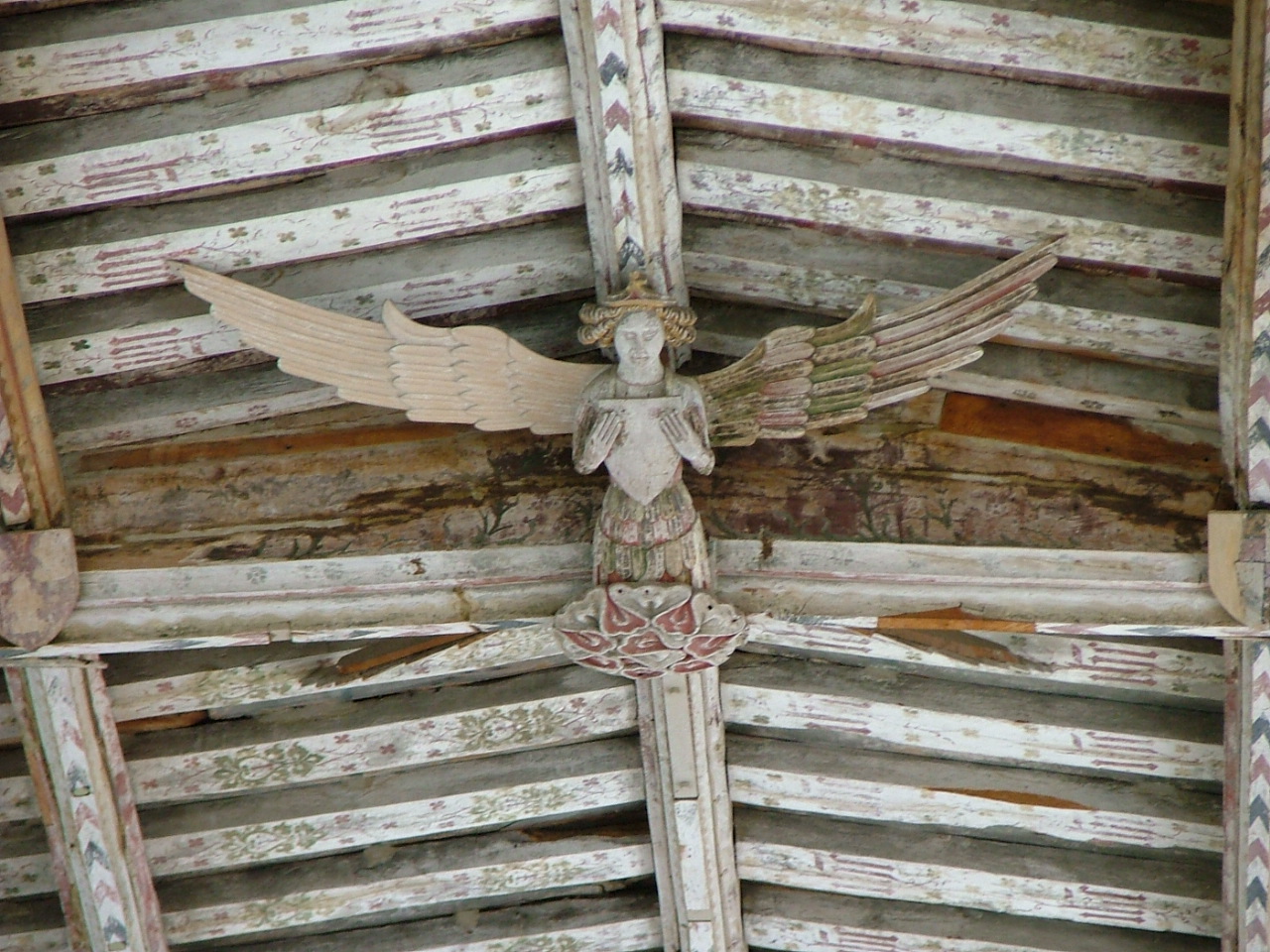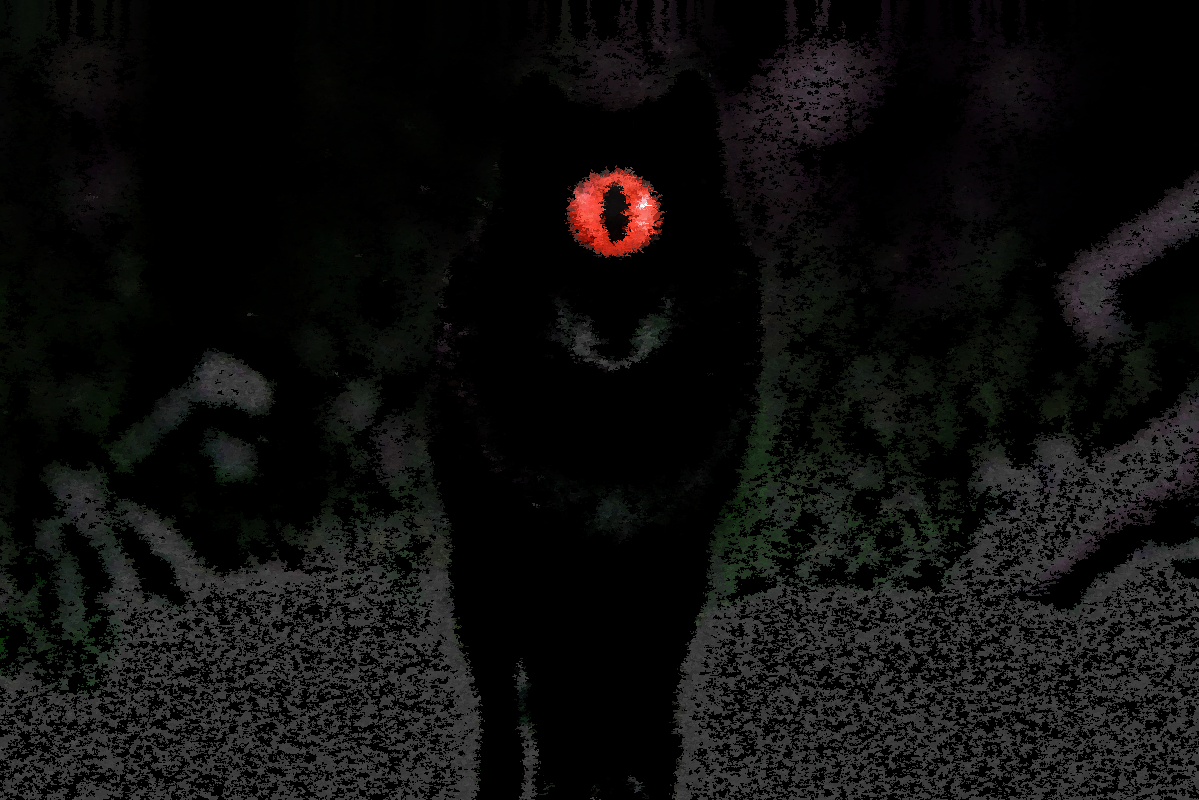|
Holy Trinity Church, Blythburgh
The Holy Trinity Church is the parish church of the village of Blythburgh in the East Suffolk area. It is part of the Church of England Halesworth deanery in the diocese of St Edmundsbury and Ipswich, and has been listed Grade I on the National Heritage List for England since December 1966. Holy Trinity Church should not be confused with the ruins of Blythburgh Priory nearby. History The parish church is dedicated to the Holy Trinity and known as the "Cathedral of the Marshes". Blythburgh was one of the earliest Christian sites in East Anglia. There was a church there in 654 to which the bodies of the East Anglian king Anna and his son Jurmin, descendants of King Wehha, were brought after their deaths in battle at Bulcamp with the Mercian king Penda. At the time of the Norman Conquest Blythburgh was part of the royal estate and had one of the richest churches in Suffolk, possibly a Saxon minster, with two daughter churches. It was probably the rich parent church that was gran ... [...More Info...] [...Related Items...] OR: [Wikipedia] [Google] [Baidu] |
Blythburgh
Blythburgh is a village and civil parish in the East Suffolk district of the English county of Suffolk. It is west of Southwold and south-east of Halesworth and lies on the River Blyth. The A12 road runs through the village which is split either side of the road. At the 2011 census the population of the parish was 297. The parish includes the hamlets of Bulcamp and Hinton. Blythburgh is best known for its church, Holy Trinity, known as the Cathedral of the Marshes. The church has been flood-lit since the 1960s and is a landmark for travellers on the A12. The village is the site of Blythburgh Priory which was founded by Augustine monks from St Osyth's Priory in Essex in the 12th century.Blythburgh Priory ruins hosts first service in 500 years BBC news website, 2011-08-02. Retrieved ... [...More Info...] [...Related Items...] OR: [Wikipedia] [Google] [Baidu] |
King Penda
Penda (died 15 November 655)Manuscript A of the ''Anglo-Saxon Chronicle'' gives the year as 655. Bede also gives the year as 655 and specifies a date, 15 November. R. L. Poole (''Studies in Chronology and History'', 1934) put forward the theory that Bede began his year in September, and consequently November 655 would actually fall in 654; Frank Stenton also dated events accordingly in his ''Anglo-Saxon England'' (1943). 1 Others have accepted Bede's given dates as meaning what they appear to mean, considering Bede's year to have begun on 25 December or 1 January (see S. Wood, 1983: "Bede's Northumbrian dates again"). The historian D. P. Kirby suggested the year 656 as a possibility, alongside 655, in case the dates given by Bede are off by one year (see Kirby's "Bede and Northumbrian Chronology", 1963). The ''Annales Cambriae'' gives the year as 657Annales Cambriae at Fordham University/ref> was a 7th-century king of Mercia, the Anglo-Saxon kingdom in what is today the Midlands ... [...More Info...] [...Related Items...] OR: [Wikipedia] [Google] [Baidu] |
Puritans
The Puritans were English Protestants in the 16th and 17th centuries who sought to purify the Church of England of Roman Catholic practices, maintaining that the Church of England had not been fully reformed and should become more Protestant. Puritanism played a significant role in English history, especially during the Protectorate. Puritans were dissatisfied with the limited extent of the English Reformation and with the Church of England's toleration of certain practices associated with the Roman Catholic Church. They formed and identified with various religious groups advocating greater purity of worship and doctrine, as well as personal and corporate piety. Puritans adopted a Reformed theology, and in that sense they were Calvinists (as were many of their earlier opponents). In church polity, some advocated separation from all other established Christian denominations in favour of autonomous gathered churches. These Separatist and Independent strands of Puritanism became ... [...More Info...] [...Related Items...] OR: [Wikipedia] [Google] [Baidu] |
Parliament Of England
The Parliament of England was the legislature of the Kingdom of England from the 13th century until 1707 when it was replaced by the Parliament of Great Britain. Parliament evolved from the great council of bishops and peers that advised the English monarch. Great councils were first called Parliaments during the reign of Henry III (). By this time, the king required Parliament's consent to levy taxation. Originally a unicameral body, a bicameral Parliament emerged when its membership was divided into the House of Lords and House of Commons, which included knights of the shire and burgesses. During Henry IV's time on the throne, the role of Parliament expanded beyond the determination of taxation policy to include the "redress of grievances," which essentially enabled English citizens to petition the body to address complaints in their local towns and counties. By this time, citizens were given the power to vote to elect their representatives—the burgesses—to the H ... [...More Info...] [...Related Items...] OR: [Wikipedia] [Google] [Baidu] |
The Darkness (band)
The Darkness are a British rock band formed in Lowestoft, England. The band consists of Justin Hawkins (lead vocals, lead guitar), his brother Dan Hawkins (rhythm guitar, backing vocals), Frankie Poullain (bass guitar, backing vocals) and Rufus Tiger Taylor (drums, backing vocals). The Darkness came to prominence with the release of their debut album, ''Permission to Land'', in 2003. Backed by the singles "I Believe in a Thing Called Love", "Growing on Me", "Get Your Hands off My Woman", and "Love Is Only a Feeling", the album was certified quadruple platinum in the United Kingdom, with sales of over 1.3 million. In 2004 the band won three Brit Awards: Best British Group, Best British Rock Act, and Best British Album. After extensive touring in support of their debut album, Poullain left the band in 2005, and was replaced by former guitar technician Richie Edwards. The band's second studio album, '' One Way Ticket to Hell... and Back'', was released in November 2005. The foll ... [...More Info...] [...Related Items...] OR: [Wikipedia] [Google] [Baidu] |
Lowestoft
Lowestoft ( ) is a coastal town and civil parish in the East Suffolk district of Suffolk, England.OS Explorer Map OL40: The Broads: (1:25 000) : . As the most easterly UK settlement, it is north-east of London, north-east of Ipswich and south-east of Norwich, and the main town in its district. The estimated population in the built-up area exceeds 70,000. Its development grew with the fishing industry and as a seaside resort with wide sandy beaches. As fishing declined, oil and gas exploitation in the North Sea in the 1960s took over. While these too have declined, Lowestoft is becoming a regional centre of the renewable energy industry. History Some of the earliest signs of settlement in Britain have been found here. Flint tools discovered in the Pakefield cliffs of south Lowestoft in 2005 allow human habitation of the area to be traced back 700,000 years.S. Parfitt et al. (2006'700,000 years old: found in Pakefield', ''British Archaeology'', January/February 2006. Retrieve ... [...More Info...] [...Related Items...] OR: [Wikipedia] [Google] [Baidu] |
Black Shuck
In English folklore, Black Shuck, Old Shuck, Old Shock or simply Shuck is the name given to a ghostly black dog which is said to roam the coastline and countryside of East Anglia, one of many such black dogs recorded in folklore across the British Isles. Accounts of Black Shuck form part of the folklore of Norfolk, Suffolk, the Cambridgeshire Fens and Essex, and descriptions of the creature's appearance and nature vary considerably; it is sometimes recorded as an omen of death, but, in other instances, is described as companionable. According to the ''Oxford English Dictionary'', the name ''Shuck'' derives from the Old English word 'devil, fiend', perhaps from the root 'to terrify'. The first mention in print of "Black Shuck" is by Reverend E. S. Taylor in an 1850 edition of the journal ''Notes and Queries'' which describes "Shuck the Dog-fiend"; "This phantom I have heard many persons in East Norfolk, and even Cambridgeshire, describe as having seen as a black shaggy dog, w ... [...More Info...] [...Related Items...] OR: [Wikipedia] [Google] [Baidu] |
Arthur Hopton (1488-1555) (1588?–1650), English diplomat who served as ambassador to Spain
{{hndis, Hopton, Arthur ...
Arthur Hopton may refer to: * Sir Arthur Hopton (1488–1555), English politician * Arthur Hopton (died 1607), English politician * Sir Arthur Hopton (diplomat) Sir Arthur Hopton (c. 1588 to 1650) was an English diplomat who spent most of his career in Madrid, where he was Resident Agent from 1630 to 1636, then Ambassador from 1638 to 1645. Uncle of Sir Ralph Hopton, a Royalist general during the 1642 ... [...More Info...] [...Related Items...] OR: [Wikipedia] [Google] [Baidu] |
Virgin Mary
Mary; arc, ܡܪܝܡ, translit=Mariam; ar, مريم, translit=Maryam; grc, Μαρία, translit=María; la, Maria; cop, Ⲙⲁⲣⲓⲁ, translit=Maria was a first-century Jewish woman of Nazareth, the wife of Joseph and the mother of Jesus. She is a central figure of Christianity, venerated under various titles such as virgin or queen, many of them mentioned in the Litany of Loreto. The Eastern and Oriental Orthodox, Church of the East, Catholic, Anglican, and Lutheran churches believe that Mary, as mother of Jesus, is the Mother of God. Other Protestant views on Mary vary, with some holding her to have considerably lesser status. The New Testament of the Bible provides the earliest documented references to Mary by name, mainly in the canonical Gospels. She is described as a young virgin who was chosen by God to conceive Jesus through the Holy Spirit. After giving birth to Jesus in Bethlehem, she raised him in the city of Nazareth in Galilee, and was in Jerusal ... [...More Info...] [...Related Items...] OR: [Wikipedia] [Google] [Baidu] |
Canons Regular
Canons regular are priests who live in community under a rule ( and canon in greek) and are generally organised into religious orders, differing from both secular canons and other forms of religious life, such as clerics regular, designated by a partly similar terminology. Preliminary distinctions All canons regular are to be distinguished from secular canons who belong to a resident group of priests but who do not take public vows and are not governed in whatever elements of life they lead in common by a historical Rule. One obvious place where such groups of priests are required is at a cathedral, where there were many Masses to celebrate and the Divine Office to be prayed together in community. Other groups were established at other churches which at some period in their history had been considered major churches, and (often thanks to particular benefactions) also in smaller centres. As a norm, canons regular live together in communities that take public vows. Their early ... [...More Info...] [...Related Items...] OR: [Wikipedia] [Google] [Baidu] |
Henry I Of England
Henry I (c. 1068 – 1 December 1135), also known as Henry Beauclerc, was King of England from 1100 to his death in 1135. He was the fourth son of William the Conqueror and was educated in Latin and the liberal arts. On William's death in 1087, Henry's elder brothers Robert Curthose and William Rufus inherited Normandy and England, respectively, but Henry was left landless. He purchased the County of Cotentin in western Normandy from Robert, but his brothers deposed him in 1091. He gradually rebuilt his power base in the Cotentin and allied himself with William Rufus against Robert. Present at the place where his brother William died in a hunting accident in 1100, Henry seized the English throne, promising at his coronation to correct many of William's less popular policies. He married Matilda of Scotland and they had two surviving children, Empress Matilda and William Adelin; he also had many illegitimate children by his many mistresses. Robert, who invaded from Normandy ... [...More Info...] [...Related Items...] OR: [Wikipedia] [Google] [Baidu] |







